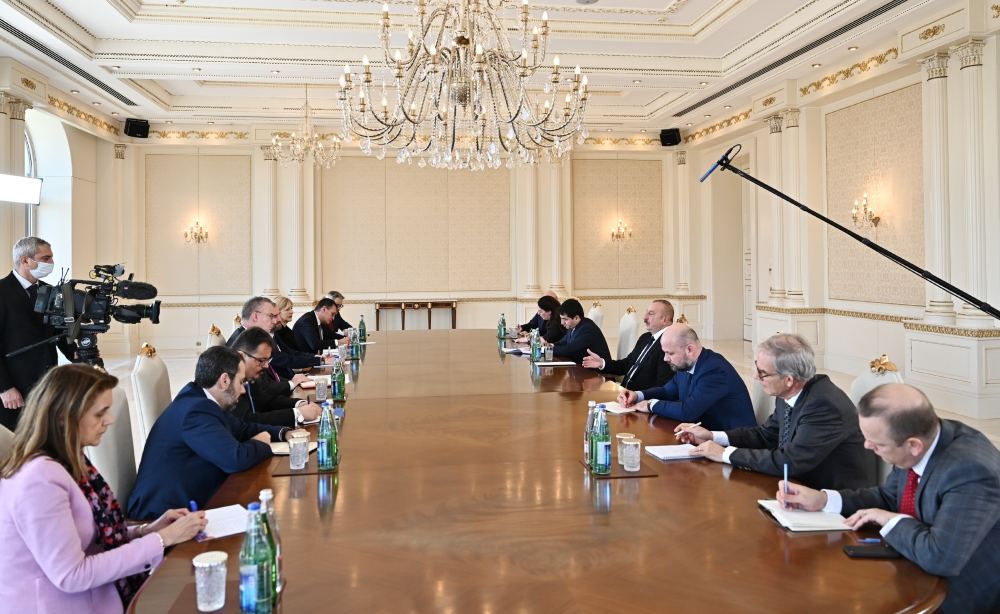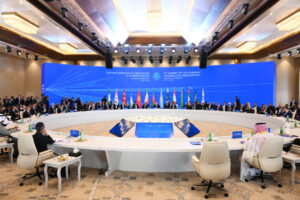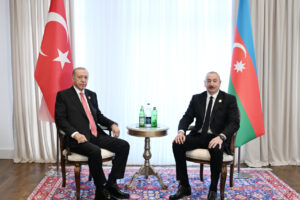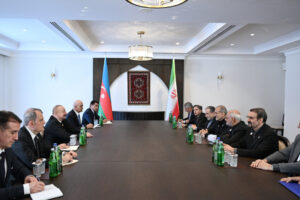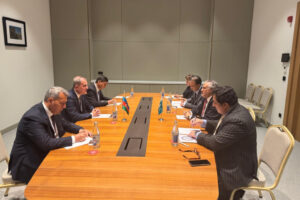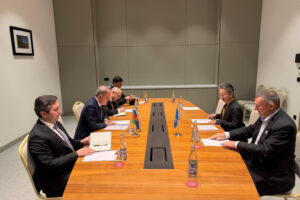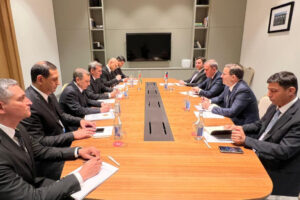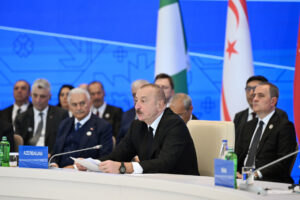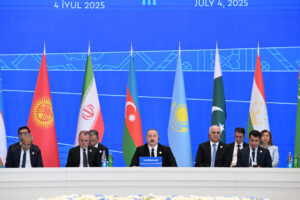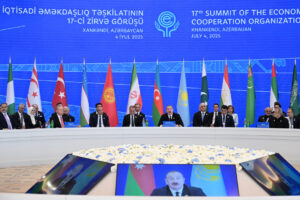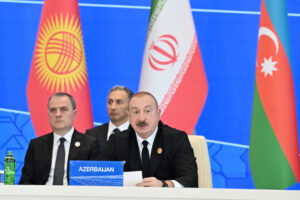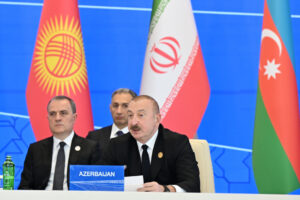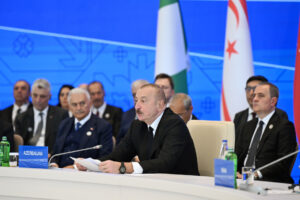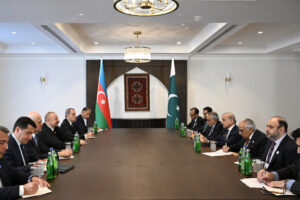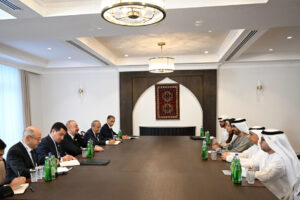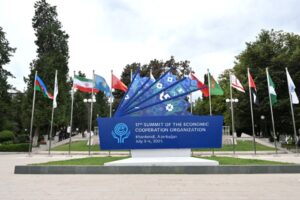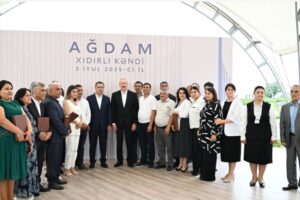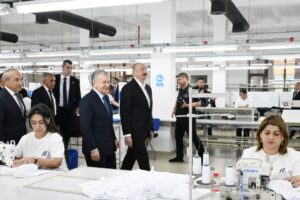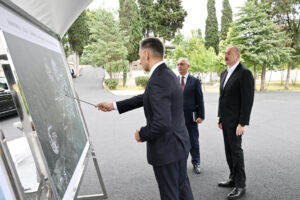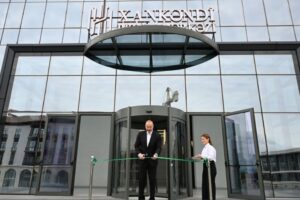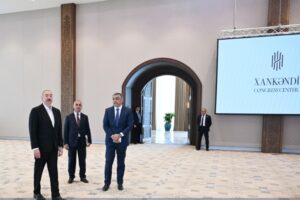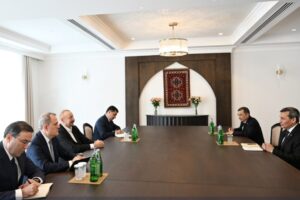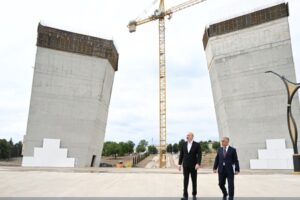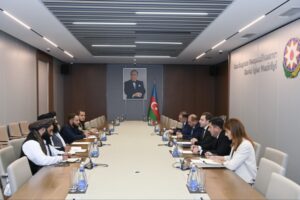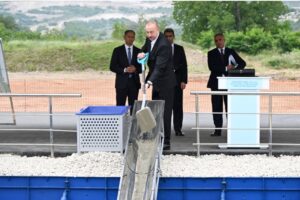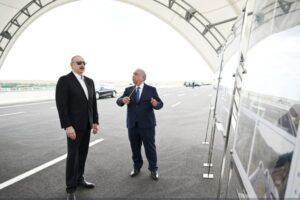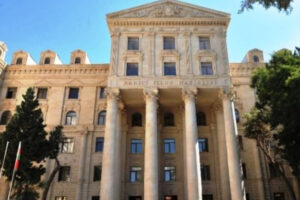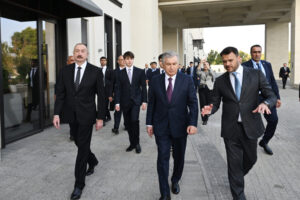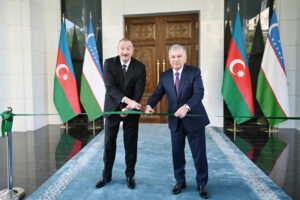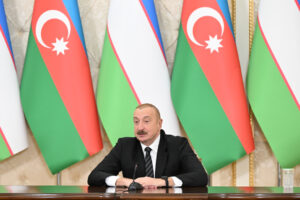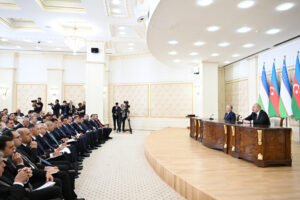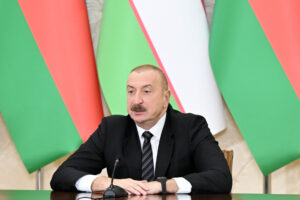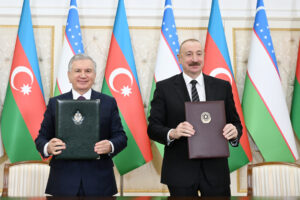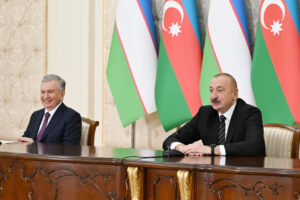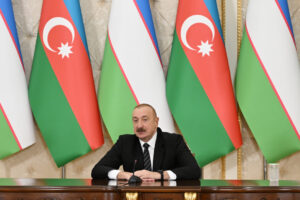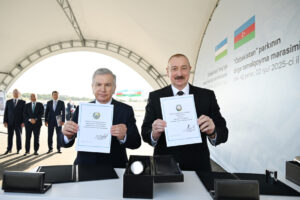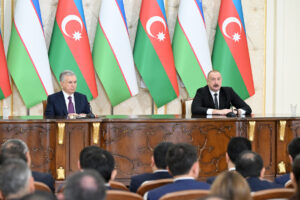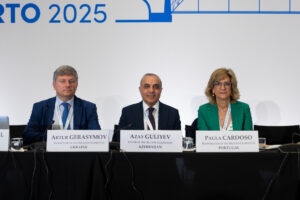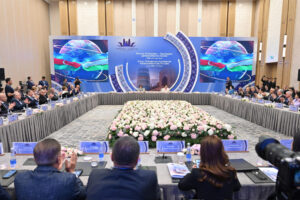Tokyo, 18 November, /AJMEDIA/
The substance and agenda of EU-Azerbaijan cooperation is very broad, Ilham Aliyev said receiving a delegation led by Special Envoy of the European Union for the Eastern Partnership Dirk Schuebel on November 17, AJMEDIA reports.
President Ilham Aliyev said: Thank you. Thank you very much. First of all, thank you for coming and I appreciate this visit. I think this is very important from the point of view of a proper evaluation of what we need to do in the future. And in general, you know that the substance and agenda of EU-Azerbaijan cooperation is very broad. And we are very satisfied with the level of cooperation in deferent areas, in political, economic, energy, humanitarian. Of course, with respect to Eastern Partnership, you know that from the very beginning of this program Azerbaijan was very supportive and participated actively in different events, including summits. Now, I agree that it is time to modernize it, to review what has been done, because it is already more than a decade has passed since the program was launched. And members of the Eastern Partnership have made their choice. Some of them signed Association Agreement, some of them joined Eurasian Economic Union, the only one is Azerbaijan which joined none of the formats. And the economic performance, economic stability, political stability and, of course, the liberation of our territories show that our foreign policy was based on pragmatism and was targeted. And the main target was to restore the territorial integrity of Azerbaijan which we did two years ago. Therefore, of course, there is a need to see what are the new opportunities with respect to the Eastern Partnership. As far as we are concerned, we considered this program, this platform not as a platform of cooperation between the member states but as an additional opportunity to enhance cooperation with EU. Because with five other members of Eastern Partnership group we have different relationship. And, of course, for us was important to have additional mechanism of cooperation with European Commission. Now, I think, you are right in the current geopolitical circumstances, we need to review it. As far as they concerned, in the meantime, we worked actively on bilateral track with member states of EU. And with nine of them we have signed or adopted strategic partnership declarations and agreements. So, this is one third of member states. And, I think Azerbaijan is unique among the Eastern Partnership group, the country which really achieved the strategic goal. So, this is a good platform and we consider it as a basis for our negotiations with EU on agreement. And it is moving successfully but slowly. Successfully, because we have completed most of the chapters, more than 90 percent, slowly that we got stuck with respect to the issues which we think can be a resolved if we have political will from both sides. There are certain concerns in Azerbaijan, because any agreement which we signed or plan to sign must give additional benefit to us and to our partners. So, we cannot sign something which in a midterm or long term can create certain economic difficulties. Therefore, the chapters where we got stuck is basically I think is trade, economic and some other. I already gave instructions to our negotiators to speed up the process and I think that there is a chance to finalize it. I think that will be another important milestone in our cooperation. We will talk, of course, about energy development and energy diversification projects. We will know what we are talking about. But taking into account that you mentioned your visit to Armenia and that you got a message from Armenian leadership about peace, you know, we have heard these messages during all the years of occupation that they want peace. And they were not sincere. We also wanted peace but we also wanted our lands back. They wanted peace not giving the lands back. This is a difference. And we had to resolve the conflict by force and then by political means. Now, when they talk about peace, I think it is a kind of manipulation, because if they really wanted peace they would have responded to our proposal. It was us who made a proposal to start negotiations on peace agreement right after the war ended. And that was one of the probably unique cases in the world history. The country which had been under occupation for so many years, which restored justice by force, and after the enemy was defeated and thrown out from our territories we offered peace. Despite all the devastations, destructions, Armenians created on our territory, and sufferings of Azerbaijanis, we offered peace. We offered a kind of framework that famous five principles, was us who advocated for establishing a commissions on delimitation, it was us who was trying to find a ground for normalization of relations. Armenia was very reluctant in the first phases of the process. Now, they talk about peace. But what do they mean by peace? We do not actually understand. Because our position is very clear. It has been articulated many times publicly and also in my contacts with the leaders of European Commission, United States, Russia, the countries which have been involved in the process of normalization that we need to have two tracks- Armenian-Azerbaijani normalization process and also issues related to Armenian minority in Azerbaijan, in Karabakh with respect to their rights and security. Just yesterday, I had a phone call from Secretary of State Blinken and once again we talked about that. We have full understanding that there must be two tracks. And they should not be mixed up. But statements from Armenia are very controversial. They say they recognize our territorial integrity and sovereignty. Not only say but they signed under that in Prague and in Sochi.
That means sovereign people of all our territory. We all understand what sovereignty means. At the same time, they want to incorporate issues related to Armenian minority in Azerbaijan into our peace agreement. It will not work. It is not possible. And we will not agree on that. Therefore, we need to have a very clear position from Armenian government about their agenda.
Therefore we need to have a very clear position from Armenian government about their agenda. And I told recently, if they want peace we want peace, if they do not want peace, well, it is their choice. We did not have peace for 30 years, what was the end of the story Armenia should not forget. Therefore, again, we need to judge their actions by steps not by words, because their words sometimes contradict what they do or what they plan. I do not know whether you got a direct answer from Armenian leadership about that. I doubt, because they want to keep this ambiguity which is not helpful. And, also the country which wants peace should refrain from very dangerous rhetoric, which Armenian officials afforded recently, comparing Azerbaijan to ISIS and Al-Qaeda, I think is a very dangerous rhetoric. First, because they acted as ISIS and Al-Qaeda. Ambassadors of EU visited the liberated territories, Armenians did the same what was done by ISIS and Al-Qaeda with respect to historical and religious heritage. It was not us, it was them. So they committed acts of terror, they committed genocide, they destroyed our mosques, not us. But Mr. Pashinyan when he uses this wording he should know that we hear it, and what will be our reaction he should also think about. So it is not easy and I think important is that Armenia should openly declare what they do want. If they want to talk about rights and security of Armenians in Karabakh, it will not work. We are ready to talk about that with Armenians who live in Karabakh, not with those who have been sent from Moscow hiding in their pockets billions of stolen money from Russian people, like person called Vardanyan who was transferred from Moscow there with a very clear agenda. But we are ready to talk to those people in Karabakh who live there and who wants to live there. We are ready. By the way, this process has started. If not for external interference and attempts to block this process from some countries, which I just mentioned, I think the process could have had better dymanic. But it has nothing to do with Pashinyan and his government. This must be separated. As I said, there is a consensus between Azerbaijan, EU, United States and Russia. Those countries and the institution, which Azerbaijan sees as those who can be helpful.

